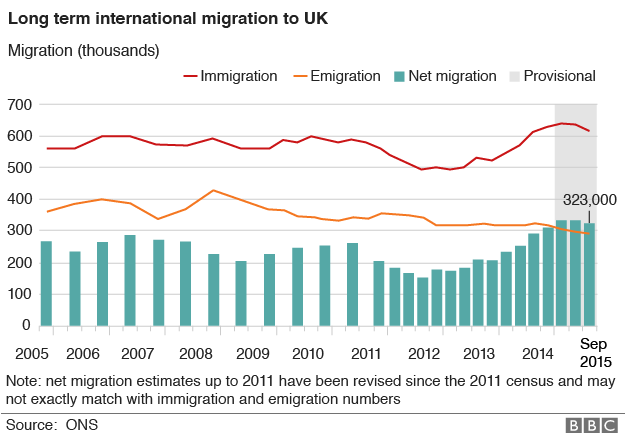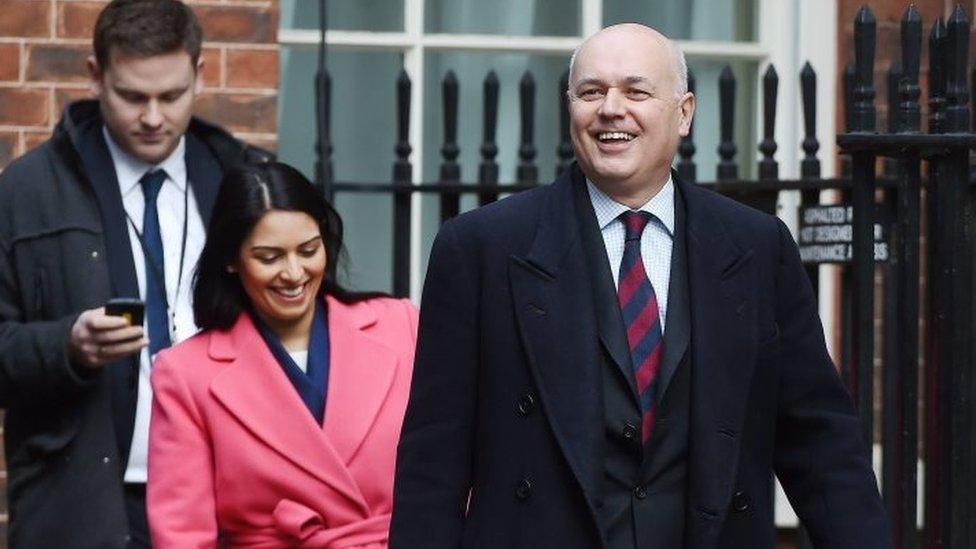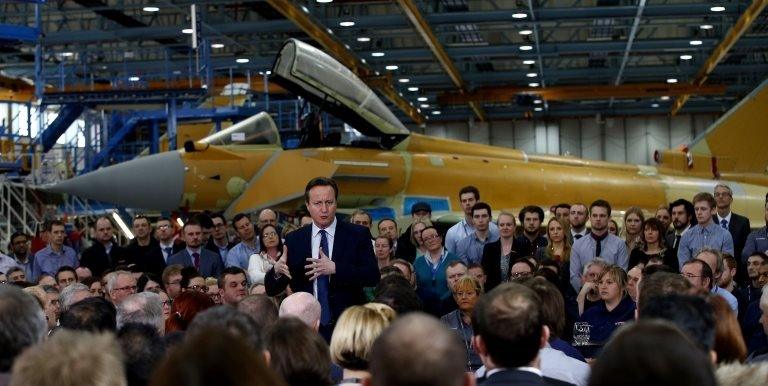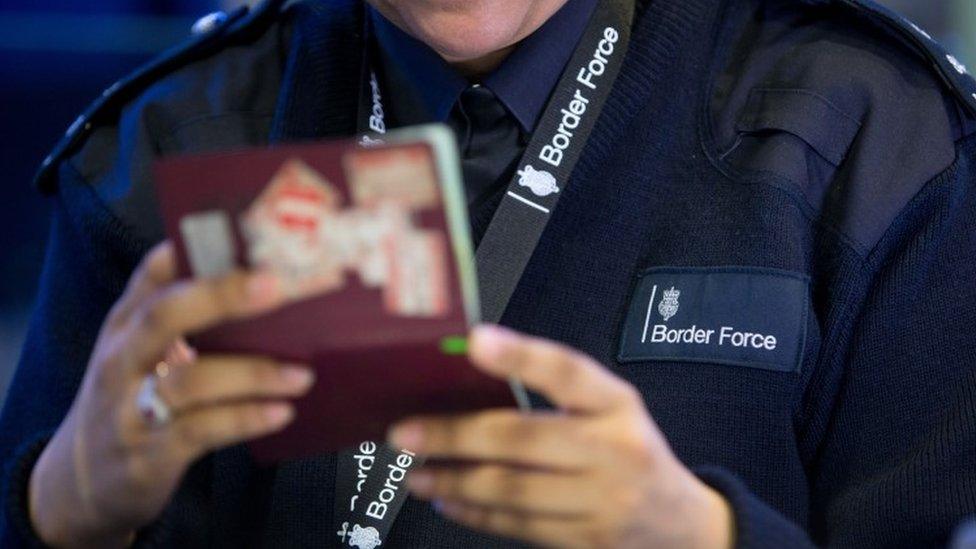Net migration at 323,000 prompts EU referendum row
- Published

New figures showing net migration to the UK remains near record levels have sparked a row between the two sides in the EU referendum debate.
The difference between the number of people leaving and arriving was 323,000 in the year to September.
David Cameron said the figure was "still too high" but the government was taking action to bring it down.
UKIP leader Nigel Farage says the only way to get immigration under control is to leave the EU in June's referendum.
The government remains committed to getting net migration below 100,000 by the next election in 2020.
The key points from the latest migration statistics include:
Net migration was at the second highest level for any 12-month period since comparable records began, according to the Office for National Statistics report, external
It was down 4% on the record of 336,000 for the year to July 2015 - the first time it has dropped since the end of 2013 - but up 11% on the previous year
Net migration of EU citizens to the UK in the year was 172,000
165,000 EU citizens came to the UK for work-related reasons - 96,000, or 58%, had a definite job to go to and 69,000, or 42%, came looking for work
Employment of EU nationals - excluding British citizens - increased by 215,000 to 2 million, according to Labour Force Survey figures for October to December 2015
Employment of non-EU nationals increased by 38,000 to 1.2 million
Nearly half of the growth in employment in the UK over the last year was accounted for by foreign nationals
45,000 Bulgarians and Romanians came to the UK for work reasons, an increase of 17,000 on the year to September 2014. About two thirds of them had a definite job to go to
There were 38,878 asylum applications, including dependants, in 2015, an increase of 20% compared with the previous year
Long-term immigration for study was estimated to be 174,000, down slightly on the previous year. There was a 5% fall in the overall number of applications for visas study at British universities, with a 2% reduction in the number of non-EU applications
Speaking at a question and answer section with BAE employees in Preston, Mr Cameron said the government was taking action "across the board" to bring immigration down.
The prime minister said it was important to "fix the issue of welfare" and his EU deal to limit in-work benefits for new EU migrants would "have an impact".
Home Secretary Theresa May, who is backing the campaign to remain in the EU, said: "Immigration at this level puts pressure on public services, on housing, on infrastructure… it can hold down wages and push British workers out of jobs."
But she said Mr Cameron's reforms would "reduce the pull factor of our welfare system and make it easier for us to deport people who are abusing our generosity".
'Laughable target'
Mrs May is in Brussels for crisis talks on limiting migration. Asked if the EU's response so far had been a mess, she said: "The EU is indeed dealing with a migration crisis and that would be the same whether the UK was in the EU or outside the EU.
"As members of the EU we are able to work with others to strengthen the external borders."
But Nigel Farage, who is campaigning for Britain to leave the EU, said: "As I've said for years, we cannot control immigration into Britain while we remain inside the EU. The government pledge to reduce net migration to tens of thousands continues to be laughable.
"I am pleased that there are now lots of voices agreeing with me, that we must leave the European Union to control our borders."

Ian Duncan Smith is among the cabinet ministers campaigning to leave the EU
Mr Farage told BBC News net migration should be capped at about 30,000 a year, which he said would represent a return to "normality" and prevent immigration being the "hot political potato that it is".
He also questioned the accuracy of the ONS figures, saying: "If as they claim only 260,000 EU nationals arriving, then how is it possible that 650,000 National Insurance numbers have been given to foreign nationals?"
Iain Duncan Smith, who is also campaigning to leave, said Mr Cameron's "emergency brake" on EU migrants accessing in-work benefits for up to four years would do nothing to reduce net migration and could lead to a short-term spike in new arrivals trying to beat the likely April 2017 introduction date.
The work and pensions secretary told the Guardian he had warned Mr Cameron, external privately that a failure to control immigration could lead to the rise of the far right.
"If you do not control your borders, my observation is that you get parties led by people like Marine Le Pen and others who feed off the back of this, and ordinary decent people feel life is out of control," he said.

Analysis by BBC Political Correspondent Ross Hawkins

The most striking attacks on David Cameron's immigration policies today came not from his political opponents, but from ministers in his own government.
In allowing them a free debate about the European Union he has licensed criticism not only of his desire to stay in the EU, but of his judgements about migration.
The annual net figures were little changed today; for almost two years now they have remained at three times the level promised by the government.
Mr Cameron has insisted that restrictions on welfare payments agreed in his EU renegotiation - sometimes referred to as an emergency brake - will reduce the appeal of the UK to would be migrants from the continent.
His assertion though has been flatly contradicted by his Eurosceptic colleagues.
Come the end of the referendum campaign Mr Cameron and his doubting ministers will face a profound challenge convincing the public that they can in future be united around a single immigration policy.

Employment minister Priti Patel said: "Even the government's own advisors the OBR are saying the emergency brake will not have a big imapct at all deterring people from the EU coming to the UK."
Labour leader Jeremy Corbyn, who is backing the remain campaign, said: "The solution is to make sure that communities that are affected are properly supported, and that our wage system reflects the going rate for the job, rather than systematic undermining of industry-wide agreements that have been made by some employers."
He also highlighted the "large numbers British people" who lived in other EU countries.
'New normal'
Madeleine Sumption, Director of the Migration Observatory at the University of Oxford said: "Free movement within the EU is not the only driver of recent high levels of net migration, but it has played an important role.
"While EU migration is a defining issue in the referendum debate, the truth is that it's difficult to predict EU migration levels with confidence in either the stay or leave scenario.
"Whether Brexit would reduce migration will depend in part on the treaties and policies that followed, and these cannot be known in advance."
She said the sustained high levels of net migration raised the question "of whether we are experiencing a temporary peak or a 'new normal' in the UK".

The Institute of Directors called the government's target for reducing net migration "futile and nonsensical" because nearly all of the increase could be accounted for by a reduction in the number of people leaving the UK.
"Ironically, if the UK economy tanked and Britons emigrated in large numbers it would make the target more achievable," said spokesman Seamus Nevin.
He added: "If the British people are to make an informed decision on the future of our country, then both sides in the EU debate need to set out a sensible plan for managing inward migration."
The latest ONS figures showed asylum applications increased for the fifth year in a row, although they remain well below their 2002 peak of 103,081.
The largest number of applications came from Eritrean nationals. Asylum claims by Syrian nationals were 2,846, an increase of 493, in addition to the 1,194 Syrian nationals granted humanitarian protection under the Syrian Vulnerable Persons Resettlement Scheme.
Some 86% of Syrians were granted asylum or other forms of protection, compared with 20% for Pakistan nationals.
- Published25 February 2016
